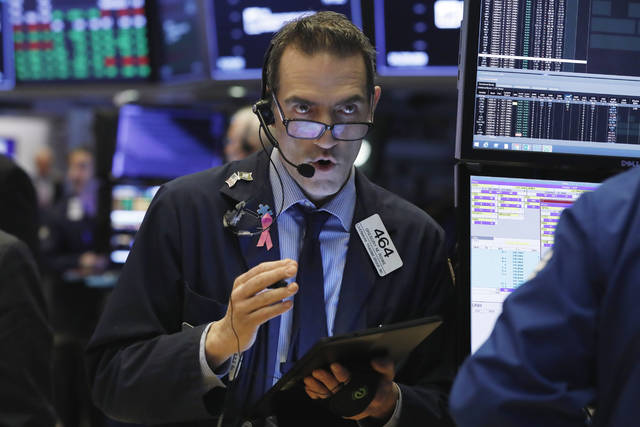U.S. stock indexes closed mostly lower Tuesday after a late-afternoon splash of selling erased early gains, ending a weeklong rally.
Banks accounted for much of the decline, along with utilities and industrial companies. Those losses offset gains in health care, technology and consumer products stocks.
The benchmark S&P 500 ended barely lower, its second loss over the past seven trading days. It’s still up 13 percent so far in 2019.
Investors were looking ahead to what the Federal Reserve will say Wednesday following a two-day meeting of policymakers. The central bank has signaled that it will be “patient” in raising interest rates.
Investors seem reassured that the Fed will continue to hold off on raising rates, and that’s given them more confidence to push the market higher this year.
“Typically, markets tend to be flat in front of the Fed, usually we’re in a wait-and-see mode,” said Kate Warne, investment strategist at Edward Jones.
The S&P 500 index slipped 0.37 points, or 0.01 percent, to 2,832.57. The Dow Jones Industrial Average dropped 26.72 points, or 0.1 percent, to 25,887.38.
The Nasdaq composite gained 9.47 points, or 0.1 percent, to 7,723.95. The Russell 2000 index of smaller-company stocks gave up 8.95 points, or 0.6 percent, to 1,554.99.
More stocks fell than rose on the New York Stock Exchange. Major indexes in Europe finished higher.
The broader market broke out of a short slump last week and has been gaining since then. It marks a turnaround from a terrifying drop in December, and now every major U.S. index is up more than 10 percent for the year.
What the Fed does next will surely have an impact on the market’s trajectory.
The central bank is expected to leave its key short-term interest rate unchanged Wednesday and to stress its new watchword — “patient”— in conveying its intention to leave rates alone for the foreseeable future.
The Fed has made clear that with a dimmer economic picture in both the United States and globally, it no longer sees the need to keep raising rates as it did four times in 2018. Among the key factors, besides slower growth, are President Donald Trump’s trade war with China, continually low inflation levels and Prime Minister Theresa May’s struggle to execute Britain’s exit from the European Union.
Signs of a modest economic slowdown, such as a weak factory orders report on Tuesday, may help keep the Fed patient and on hold for a longer amount of time, said Warne.
“It’s a slightly bad-news-is-good-news situation,” she said.
There has also been an absence of sharp bad news surprises, she said, which has given investors confidence that there is less volatility than previously feared.
Financial, utilities and industrial stocks weighed the most on the market Tuesday. Fifth Third Bancorp dropped 3.3 percent, FirstEnergy slid 2 percent and railroad operator Union Pacific lost 3.3 percent.
Companies that reported disappointing quarterly results also fell.
DSW dropped 12.9 percent after the footwear retailer surprised investors with a loss during the fourth quarter. The company swung to a loss of 7 cents per share, while Wall Street anticipated 4 cents per share in profit. Expenses jumped during the quarter and DSW had to deal with a hefty charge.
Tilray slid 3.4 percent after the medical cannabis company reported a wider loss for the fourth-quarter than Wall Street analysts expected.
Health care stocks, technology companies and retailers notched some of the biggest gains Tuesday.
DaVita led the health sector higher, climbing 3.5 percent. Cigna added 3.4 percent. Chipmakers also posted solid gains. Advanced Micro Devices vaulted 11.8 percent and Nvidia climbed 4 percent. Retailer L Brands added 2.7 percent.
Traders bid up shares in Michaels, rewarding a better-than-expected fourth quarter and overlooking a weak forecast. The arts and crafts retailer has been reassessing its operations, moving to expand its children’s offerings and shuttering its Pat Catan craft stores.
The company also changed leadership earlier this month, with CEO Chuck Rubin stepping down and longtime retail executive Mark Cosby taking over as interim CEO. The stock jumped 10 percent.
Bond prices fell. The yield on the 10-year Treasury rose to 2.62 percent from 2.60 late Monday.
The dollar held steady at 111.41 Japanese yen. The euro strengthened to $1.1352 from $1.1338 on Monday.
Benchmark U.S. crude oil slipped 0.1 percent to settle at $59.03 a barrel, while Brent crude gained 0.1 percent to close at $67.61 a barrel.
Wholesale gasoline climbed 0.5 percent to $1.89 a gallon, heating oil added 1.1 percent to $1.99 a gallon and natural gas picked up 0.8 percent to $2.87 per 1,000 cubic feet.
Gold rose 0.4 percent to $1,306.50 an ounce, silver added 0.3 percent to $15.37 an ounce and copper picked up 0.5 percent to $2.92 a pound.


